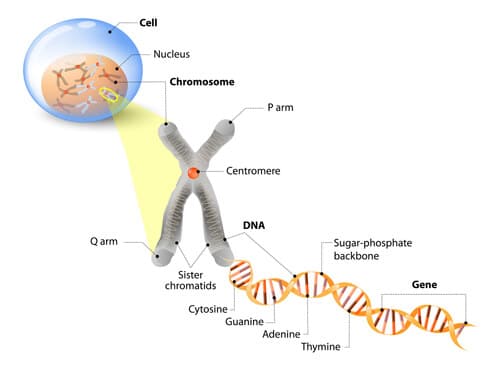The karyotype is an image that shows the chromosomes of a cell in a certain order and classified according to their size, shape and banding pattern, which are regions of DNA with different physical and chemical properties. Karyotyping is used to identify chromosomal abnormalities, such as the presence of an abnormal number of chromosomes, defective chromosomes, or structural changes in chromosomes. The most common technique for obtaining karyotyping is conventional cytogenetics, which involves observing cells in mitosis (cell division) under a microscope after they have been treated with agents that stop cell division at a specific stage.
Importance of karyotype in fertility studies
The karyotype is an important tool in fertility studies because can detect chromosomal abnormalities that can affect a person's reproductive capacity. Some chromosomal abnormalities, such as balanced translocations, do not cause obvious health problems, but can have a negative impact on fertility. However, other chromosomal abnormalities, such as the presence of an abnormal number of chromosomes or defective chromosomes, They can cause serious fertility problems, including infertility.
The karyotype is performed Both men and women who experience fertility problems. In men, karyotyping is used to detect chromosomal abnormalities that may affect sperm production or sperm quality. In women, karyotyping is used to detect chromosomal abnormalities that may cause fertility problems or miscarriage.
In addition, karyotyping is also useful for the diagnosis of inherited genetic disorders which can affect fertility and the health of offspring. In some cases, karyotyping may be part of a broader evaluation that includes other genetic and hormonal tests to determine the underlying cause of infertility. In summary, karyotyping is an important tool in fertility evaluation because it can identify chromosomal abnormalities that may be affecting a person's reproductive ability.
Karyotyping is done with a blood test
Peripheral blood karyotyping is a procedure that must be performed by a health professional trained in cytogenetics. It is usually performed in clinical cytogenetics laboratories, which are specialized units within clinical or imaging laboratories.
The peripheral blood karyotype is a safe and simple test that does not require prior preparation by the patient.
Teletest fertility and microbiota analysis 🦠 + Discount Code
Options in assisted reproduction if the karyotype shows any alteration
If a karyotype reveals a chromosomal alteration in one or both members of a couple seeking to conceive through assisted reproduction, there are several options and approaches they can consider, depending on the nature and severity of the alteration:
- Preimplantation Genetic Diagnosis (PGD): This technique involves the in vitro fertilization (IVF), where eggs are fertilized with sperm in the laboratory. Before transferring any embryo to the uterus, PGD is performed to analyze the chromosomal constitution of the embryos and select those that have a normal chromosome complement. This helps prevent the transmission of genetic abnormalities to offspring.
- Egg or sperm donation: If one of the members of the couple has a serious genetic alteration that could be passed on to their offspring, they may consider using eggs or sperm donated by a healthy donor. This ensures that the donor's genetic material does not contain the alteration.
- In vitro fertilization with prenatal diagnosis (IVF-DP): Instead of doing PGD on embryos, some patients choose to perform prenatal diagnosis once the pregnancy is confirmed. This allows informed decisions to be made about continuing or terminating the pregnancy if the fetus has the chromosomal alteration.
- Adoption: If the couple does not want to face the risks associated with genetic alterations, they can consider adoption as a way to start a family.
- Genetic consultation: In all cases, it is essential to consult a geneticist or genetic counselor to discuss the implications of the chromosomal alteration and the available options. They can provide advice on the likelihood of passing the disorder on to offspring, as well as information on assisted reproduction options and the ethical and emotional implications.
Choosing the appropriate option will depend on the couple's individual situation, the nature of the chromosomal alteration, and their family goals. It is important to have the support of health professionals and genetic counselors to make informed decisions and consider long-term implications.
Fertility discounts: tests, thermometers, accessories and clinics

